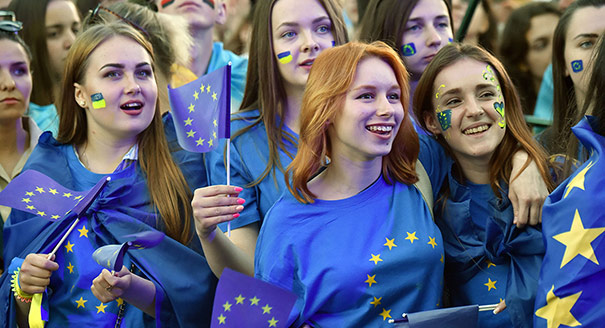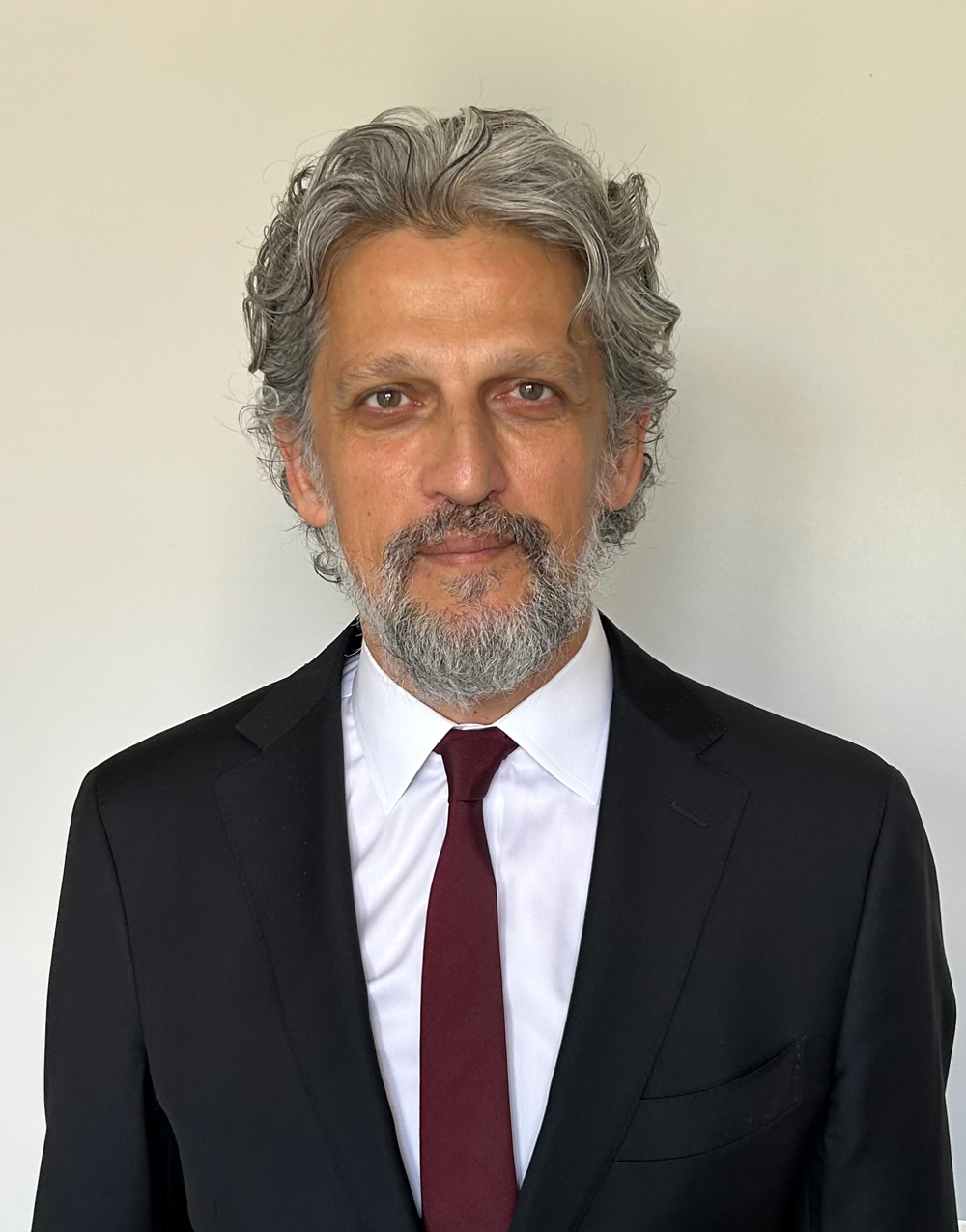Washington and New Delhi should be proud of their putative deal. But international politics isn’t the domain of unicorns and leprechauns, and collateral damage can’t simply be wished away.
Evan A. Feigenbaum
{
"authors": [
"Nicu Popescu"
],
"type": "commentary",
"centerAffiliationAll": "",
"centers": [
"Carnegie Endowment for International Peace",
"Carnegie Russia Eurasia Center"
],
"collections": [],
"englishNewsletterAll": "",
"nonEnglishNewsletterAll": "",
"primaryCenter": "Carnegie Russia Eurasia Center",
"programAffiliation": "",
"programs": [],
"projects": [],
"regions": [],
"topics": [
"Economy"
]
}
Source: Getty
Those in Moscow who believe that all is not lost for Russia in Ukraine, citing the example of Georgia, which is gradually normalizing relations with Russia despite the 2008 war, are being overly optimistic. While the current animosity in Russian-Ukrainian relations will almost certainly cool down in a few years, the underlying foundation of that relationship has been fundamentally altered. Most crucially, Ukraine’s economic dependence on Russia has been decreasing—and with it, Russian leverage over its neighbor.
It is something of a truism in the West and Ukraine to claim that by annexing Crimea and firing up the war in the Donbas, Russia has lost Ukraine. That’s not quite the thinking in Moscow. A tide of self-soothing geopolitical rationalization that is sweeping across Moscow’s foreign policy makers maintains that all is not lost for Russia in Ukraine. The source of this optimism is Russia’s relationship with Georgia: another country that fought a war with Russia, but which less than a decade later entered into a process of gradual political normalization, and something of an economic reset, with Russia.
If it worked with Georgia, it will work in Ukraine, goes the thinking in Moscow. But is that really the case? Are such hopes wishful thinking on Russia’s part, or might Ukraine, in a decade or so, really seek the normalization of its relations with Russia, without the conflicts over Crimea and the Donbas ever being solved?
The scenario of Ukraine and Russia more or less mending fences in a a few years is indeed likely. Even though Russia’s military actions in Ukraine has turned Ukrainians against Russia more than ever before, such feelings—and geopolitical leanings—often get diluted over time. For all the anti-Russia emotions sweeping Ukraine, it is not the first post-Soviet country to fight a ‘hybrid’ or open war with Russia. Both Georgia and Moldova fought wars with separatist forces supported by Russia in 1991–1993, but soon enough—by 1994—both countries had quite Russia-friendly governments.
The cycle repeated itself in slower motion with Georgia after the 2008 war. Russia imposed a series of trade embargoes on Georgian exports in the mid-2000s, sent its troops into Georgia in 2008, recognized Georgia’s breakaway regions of Abkhazia and South Ossetia as independent states, then proceeded to integrate them gradually into the Russian military, economic, and political space—and Georgia is still pursuing a cautious and gradual normalization of relations with Russia.
Georgia and its population are certainly not pro-Russian, but the levels of animosity toward Russia have decreased dramatically, while trade has soared. Between 2012 and 2017, Georgian exports to Russia increased 900 percent. In 2017 alone, overall trade almost doubled from $206 million to $394 million. Direct flights between the two countries have resumed, and the number of Russian tourists visiting Georgia has increased by 40 percent in the last two years.

Certainly, one might argue that the war in Ukraine has been much bloodier than that in Georgia (or Moldova); that the annexation of Crimea will be a constant sore point; and that the lack of a ceasefire in the Donbas, the continuing stream of soldiers deployed there, and the endless flow of coffins from the Donbas to the rest of Ukraine will continue to feed the animosity of most Ukrainians and Ukraine’s political class toward Russia. This is true. But it is equally true that Ukraine has always had a much greater proportion of its population and elites leaning toward Russia than either Georgia or Moldova. So across much of Ukraine, the seeds of a future rapprochement with Russia are also stronger than in either Moldova or Georgia.
There are already signs of this. Despite the continuing low-intensity war in the Donbas, the percentage of Ukrainians who had a positive attitude toward Russia was 24 percent in 2015, and that increased to 28 percent the next year, despite the ongoing tense situation in the Donbas and constant exchanges of fire. Support for European integration, however, decreased from 63 percent to 51 percent between 2014 and 2017, according to a recent poll conducted by the Gorshenin Institute research center and the Friedrich Ebert Stiftung political foundation.
In other words, Russia’s hopes that political relations with Ukraine could be somewhat normalized in a few years are not complete fantasy, and this influences the Russian approach to the Donbas. Just as Georgia is normalizing relations with Russia despite the latter continuing to swallow Abkhazia and South Ossetia, so will Ukraine, goes the thinking in Moscow.
Many in Europe and the United States argue that Russia’s interference in the Donbas is too costly for the country, and that Moscow might accept a well-packaged face-saving way out. But such thinking is far too Marxist, in the sense of being too economy-centric. Russia does not think about the Donbas—and its own security as a whole—through the narrow lens of economic cost-benefit calculations.
In current Russian geopolitical thinking regarding international behavior, economic calculations are subordinate to security considerations. And for Russia, keeping the Donbas under its control is seen as a matter of security. It might not be cheap, but it is not that expensive either. It is like having an army or building a fortress: not cheap, but necessary. As a consequence, military modernization and having a strong military presence in places like Crimea and the Donbas will beat healthcare or education in Russian budget priorities for the foreseeable future.
An indicator of how differently Russia and the West look at costs and security as a whole are broader defense spending patterns. Russia’s military modernization proceeded against the background of a largely stagnating and even contracting economy, because security is a top priority for Russia.
For NATO member states, economic considerations appear to take precedence. Much is made of the fact that the war in Ukraine arrested the reduction in military spending across NATO. That is true. But it is equally true that even after the annexation of Crimea and the war in the Donbas, overall NATO defense spending continued to fall for two years in a row (2014–2015). It grew modestly in 2016 and 2017, but defense spending levels have still not reached 2013 levels, let alone those of 2010 or 2012, when it was even higher.

These numbers suggest that Russia and NATO are at loggerheads in the guns versus butter debate. For Russia, guns matter more than butter, and for the West, butter matters more than guns. As a consequence, Russia is unlikely to significantly alter its approach to Ukraine and the Donbas specifically because of the supposed costs of its policies.
A Russian policymaker involved in the Minsk talks aimed at finding a solution to the Ukraine conflict was asked recently asked – off the record - whether Moscow could afford the cost of the Donbas. He answered candidly that no one had bothered to calculate it, since it was not exactly a preoccupation, but whatever it may be, “the West knows we can bear these costs for a very, very long time.” Certainly Russia would not mind minimizing the costs, but not at the price of forfeiting control of the Donbas, which in Moscow’s mind is an important piece of the country’s security puzzle.
Russia’s recent proposals for a UN protection force for the OSCE monitors in the Donbas does not change that, because what Russia has proposed is not a peacekeeping mission but a protection force—in other words, bodyguards—for the existing OSCE monitoring mission. It would not change much the status quo on the ground, which is heading on autopilot toward a slow-burning Nagorno-Karabakh-style conflict without peacekeepers, but with regular exchanges of fire, rather than a Transdniestria-style frozen conflict.
As part of that process, the construction of a full-blown military infrastructure in the Donbas has continued unabated, as if the prospect of implementing the Minsk accords does not exist. Such an approach is also rooted in some of the lessons Russia learned from its relations with Moldova and Georgia: stick to the separatist zones, and in due course the governments in Chisinau and Tbilisi will be open to a political rapprochement irrespectively, a geopolitical form of having your cake and eating it, too. Or, as the Russian idiom goes: the wolves are sated, and the sheep intact.
The lesson Russia has learned, however, might be true for politics, but is not true for the economy. In other words, if the West is too economically deterministic in its analysis of Russia, Moscow is insufficiently so when it looks at the post-Soviet space.
Russia might be reassured by the course of its relations with Georgia, but it has not learned the full lessons of its relations with either Georgia or Moldova. Its expectations of Ukraine might, therefore, be overly optimistic. Public opinion and the ebbs and flows of politics in unconsolidated democracies like Ukraine, Moldova, and Georgia are not the only thing that matters. Economics matter a great deal as well.
Economic trends have been somewhat damaging to Russia’s leverage in the region. Periods of political disruption such as the current conflict between Russia and Ukraine initiate much deeper trends, fairly independent of the recurring cycles of volatile political moods.
With each new crisis, be it wars or trade embargoes, trade with Russia—and therefore economic dependence on Russia—has been decreasing. With it, Russia’s economic leverage has also fallen. Such trends have direct geopolitical consequences. When Ukraine’s former president Viktor Yanukovych hesitated to sign the Association Agreement with the EU in 2013, Ukraine’s external trade structure represented a brutal dilemma for Kiev, as at the time, roughly a third of Ukraine’s external trade was with the EU and roughly a third with Russia. Russia’s threats to significantly restrict trade with Ukraine should it sign the Association Agreement were a paralyzing prospect for Kiev. Not so for Georgia or Moldova.
In 2013–2014, Russia warned not only Ukraine but also Moldova (and partly Georgia) against signing an Association Agreement with the EU. In 2014, when the association agreements were signed, Russia represented 7 percent of Georgia’s external trade, and 15 percent of Moldova’s trade. The EU traded almost four times more with Georgia and Moldova than Russia did. The key reason Russia had so little trade with both Georgia and Moldova were numerous trade embargoes imposed on these countries from about 2006. Each of those trade embargoes hit the economy of these countries hard, but they also reduced Russian trade leverage to the point of it becoming almost negligible.
A similar process has been taking place in Russia-Ukraine trade relations since 2014. If Ukraine’s trade with Russia and the EU was roughly equal before 2014, by 2017 Ukraine traded three times more with the EU than with Russia (about 40 percent versus 12 percent of Ukraine’s external trade structure). As long as Ukraine has a free trade area with the EU and continued mutual trade restrictions with Russia, such trade patterns are likely to remain, and to have long-term consequences for Ukraine’s external trade dependencies (and EU and Russian trade leverage), irrespective of the fluctuations in Ukrainian politics.

Moldova is proof of this. The country has a president who is strongly pro-Russian in statements, but when 65 percent of the country’s exports go to the EU, and only 10.9 percent go to Russia, a withdrawal from the Association Agreement with the EU and a potential move toward the Eurasian Union would be suicidal for the country’s economy and the politicians who would consider doing so. That is how economic realities constrain geopolitical choices.

In 2012–2016, Ukraine became the ninth-biggest global exporter of arms, overtaking Sweden, the Netherlands, and Israel, and breathing down the necks of Italy and Spain. When it comes to energy, Ukraine has managed to wean itself off Russian gas supplies already, by buying gas in the EU. Even if Ukraine starts buying Russian gas again, it is highly unlikely that it will ever go back to being as dependent on Russian gas, as it was until 2013.
Ukrainian history books are changing, reflecting a far more antagonistic relationship with Russia, and bookshop shelves already contain dozens of memoirs from the war with Russia in the Donbas. Concrete avenues of Russian influence on Ukraine—like the hopes of attracting it into the Eurasian Union—have been sealed off.
The rise of politicians in Ukraine who are more friendly to Russia than now is not impossible. But deeper economic and societal trends will prove more persistent and disruptive for Russian-Ukrainian relations than the ebbs and flows of Ukrainian domestic politics and diplomatic approaches to Russia. The true lesson taught by relations with Georgia, therefore, should be of little comfort to Russia: a cooling down of political tensions is almost certain, but there is not return to the past.

Carnegie does not take institutional positions on public policy issues; the views represented herein are those of the author(s) and do not necessarily reflect the views of Carnegie, its staff, or its trustees.
Washington and New Delhi should be proud of their putative deal. But international politics isn’t the domain of unicorns and leprechauns, and collateral damage can’t simply be wished away.

Evan A. Feigenbaum
Senior climate, finance, and mobility experts discuss how the Fund for Responding to Loss and Damage could unlock financing for climate mobility.

Alejandro Martin Rodriguez
The EU lacks leadership and strategic planning in the South Caucasus, while the United States is leading the charge. To secure its geopolitical interests, Brussels must invest in new connectivity for the region.

Zaur Shiriyev
An Armenia-Azerbaijan settlement may be the only realistic test case for making glossy promises a reality.

Garo Paylan
Venezuelans deserve to participate in collective decisionmaking and determine their own futures.

Jennifer McCoy